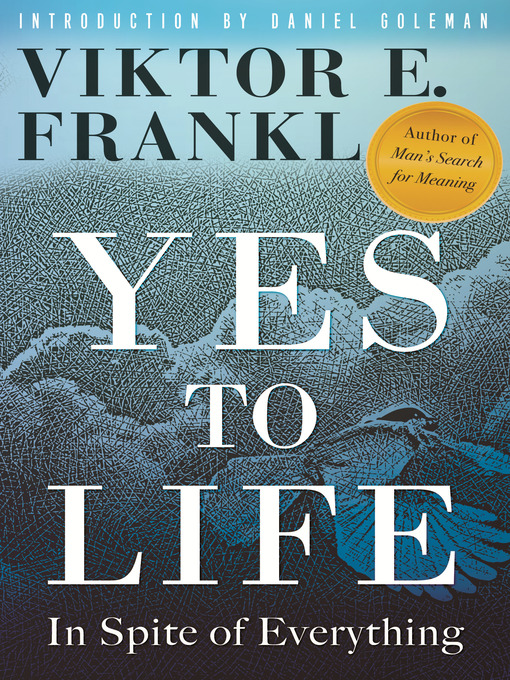
Yes to Life
In Spite of Everything
کتاب های مرتبط
- اطلاعات
- نقد و بررسی
- دیدگاه کاربران
نقد و بررسی

March 1, 2020
Published for the first time in English translation, these speeches introduce the Austrian psychiatrist and Holocaust survivor's belief in the essential meaningfulness of life. Frankl gave these three lectures in Vienna in 1946, just nine months after his liberation from a concentration camp. Together, they offer a condensed primer to his best-known work, Man's Search for Meaning (1946). Known as "logotherapy," Frankl's approach aimed to help suicidal people find meaning through creativity, love, and suffering. This was no mere intellectual construct but a pattern he observed in his patients and manifested in his own life. Fatalism is overcome, Frankl insists, by individuals creating meaning. However, this is more complicated than achieving contentment, for in a "balance sheet" view of life, bad moments outweigh good ones. Therefore, happiness cannot be the goal, he argues. Instead of asking "What can I expect from life?" he advocates flipping the question to "What does life expect of me?" Joy comes from fulfilling that duty. He gives the real-life example of a man being sent away for a life sentence: Frankl expects the prisoner would then have deemed his existence meaningless, yet when fire broke out on the prison ship, he saved 10 lives. From this, the author concludes that "none of us knows what is waiting for us" and so suicide is "the one thing that is certainly senseless." Furthermore, illness and suffering offer opportunities for spiritual growth, whether through resistance or--if death is inevitable--acceptance. Frankl cites a terminally ill patient who could no longer work but found meaning in reading, music, and conversation. To modern readers, many of the sentences may seem convoluted while the oral format accounts for slight repetition. However, the case studies are relatable and the overall viewpoint convincing. Psychologist Daniel Goleman's introduction, though overlong, gives useful context. More than 70 years later, Frankl's philosophy still inspires.
COPYRIGHT(2020) Kirkus Reviews, ALL RIGHTS RESERVED.

Starred review from March 30, 2020
Based on three public lectures delivered in Vienna in 1946, this slim, powerful collection from Austrian neurologist and psychiatrist Frankl (Man’s Search for Meaning) attests to life’s meaning, even in desperate circumstances. Coming less than a year after Frankl’s liberation from Auschwitz, Frankl’s writings address a postwar “spiritually bombed out” audience that knows the evils of which humanity is capable. Frankl (1905–1997) claims that it is not humanity’s role to question life’s meaning, but rather it’s life that demands people reflect on their purpose. Frankl posits three ways in which humans find meaning: through work; through experiencing nature, art, or love; and through how they accept unwelcome circumstances. He offers an example of a patient of his who lived a meaningful life: a graphic designer who had fallen ill and, no longer able to work, enjoyed reading and music; when dying, he asked for his final morphine shot at the doctor’s convenience, thus thinking of others at his last hour. An afterward by Frank Vesely, Frankl’s son-in-law, attests to how Frankl’s own sense of purpose helped him survive both the Holocaust and subsequent losses. This lovely work transcends its original context, offering wisdom and guidance.

May 1, 2020
Less than a year after his liberation from a Nazi concentration camp, psychiatrist Frankl delivered the three lectures in this slim book. They present the central elements of his psychotherapeutic thought as borne out by his camp experiences. From early in his career, Frankl was concerned with suicide prevention, very successfully once he concluded that what is essential to living is the individual's belief that life is meaningful. These lectures, as he summarily says of them, argue from the cases of particular patients and camp survivors who found that choosing a meaning for life enables one to ?despite hardship and death (first lecture), despite suffering from physical or mental illness (second lecture), or under the fate of the concentration camp (third lecture)?say yes to life. Shortly after, Frankl expanded these lectures into Man's Search for Meaning, an international success that by the time of his death in 1997 had sold 10 million copies. Though also severely criticized, his psychoanalytic method, logotherapy ( talk therapy ), has been adapted successfully by many psychological practitioners.(Reprinted with permission of Booklist, copyright 2020, American Library Association.)

























دیدگاه کاربران